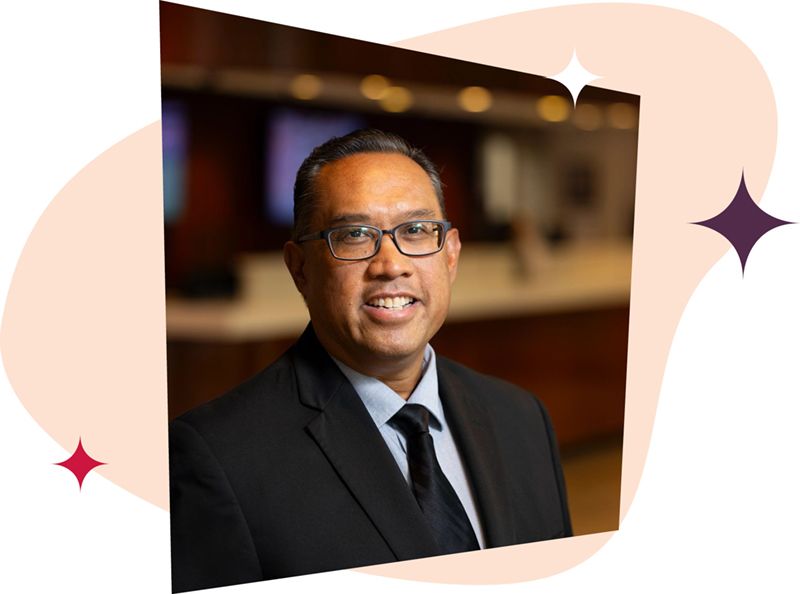Be Our Guest




The University of Georgia redefines Southern hospitality through a thriving degree program
Born and raised in Chicago, John Salazar has been fascinated by the hustle and bustle of the hospitality industry for as long as he can remember.
“When I was in high school in Chicago, I enjoyed visiting the hotels downtown, where I got a feel for the industry. Hotel lobbies are some of the liveliest places in a city, and I was drawn to the activity I saw there, the beautiful work settings, the guest interactions, the history in these buildings,” Salazar said.
Following this passion, Salazar majored in hospitality in college, took internships with Marriott International and worked at Logan International Airport to better understand the full scope of the hospitality industry. At the end of his first year of college at Southern Illinois University in Carbondale, Salazar considered transferring to a program at Michigan State University or Northeastern University, along with a few other options farther south. One of the options was the University of Georgia.
John Salazar (Photo by Andrew Davis Tucker)
John Salazar (Photo by Andrew Davis Tucker)
“I knew they had a reputable program in their family and consumer sciences college, and I’d always had a desire to explore the Southern United States more fully, so I picked up the phone and gave UGA a call to learn more,” said Salazar.
Unfortunately, he learned that UGA was ending their program, so Salazar decided to attend Northeastern University in Boston, where he received a bachelor’s degree in commercial recreation management with a specialization in hotel management. More than 30 years later, an email from a colleague put Athens, Georgia, back on Salazar’s life map. In 2019, Salazar was hired to start the Hospitality and Food Industry Management (HFIM) program in the College of Agricultural and Environmental Sciences.
Since its rebirth with Salazar at the helm as a professor and director, the HFIM program has experienced exponential growth. HFIM is the second-fastest-growing major at UGA since 2019, with 335% growth since its establishment.
HFIM interns have been placed with 81 companies in 13 states and the District of Columbia, totaling 144 internship placements. Students are exposed to the broad scope of hospitality through placements ranging from Chateau Elan Winery and Resort in Braselton, Georgia, to Walt Disney World in Orlando, Florida.
“I think the fast growth of our program demonstrates that hospitality and tourism are vital components of the state economy,” Salazar said. “Our program is not based on the theoretical or the case study, it’s based on real-life experience and the practice of hospitality leadership.”
In Georgia alone, there are nearly 400,000 individuals employed in some segment of hospitality. With the unique mix of leisure travel in coastal Georgia and convention travel in Atlanta, HFIM students have a wealth of opportunities to choose the area that suits them best.
This versatile experience — with its focus on quality curriculum, meaningful interaction with local and national business, and experiential learning — has already begun graduating the next generation of hospitality leaders.
“When our students are being hired right out of the gate for management positions, that’s how I know what we’re doing is working,” Salazar said.
To learn more about the Hospitality and Food Industry Management program, and Georgia’s hospitality ecosystem, listen to John Salazar on “Cultivating Curiosity,” a podcast produced by CAES.

Fausto Zamorano
Fausto Zamorano
Firing up a culinary career
Fausto Zamorano, chef de cuisine, Five & Ten
Five & Ten in Athens, Georgia, where Zamorano is chef de cuisine.
Five & Ten in Athens, Georgia, where Zamorano is chef de cuisine.
As the head chef at an iconic Athens, Georgia, restaurant, Fausto Zamorano always has a lot on his plate.
He is in charge of the day-to-day kitchen operation at Five & Ten, which serves contemporary Southern food with worldwide influences. His responsibilities include hiring, training and supervising cooks and food preparation workers; developing menus; ordering food, equipment and supplies; and overseeing kitchen cleanliness and functionality.
Just a few years ago, aside from eating, “I didn’t have a relationship with food,” said Zamorano, who grew up in Alpharetta, Georgia. “My parents always cooked at home, but I was never into being in the kitchen and watching them cook.”
When Zamorano enrolled as an entertainment and media major at the University of North Georgia, he was already thinking about a transfer to the University of Georgia. Once accepted at UGA, he was browsing through a list of available majors when the Hospitality and Food Industry Management (HFIM) program caught his eye.
“I had already been cooking for a couple years and I didn’t have a lot of entertainment and media studies experience,” he said. “So kind of on a whim, I decided to give the HFIM program a shot, and it ended up working out.”
He picked up cooking jobs around town to pay for rent.
“The more restaurants I worked in, the more I realized this was something I really enjoyed doing and learning about,” Zamorano said. “I ended up falling in love with cooking and the restaurant business and stuck with it.”
He graduated with his HFIM degree in 2021.
“The HFIM program gave me a good understanding of the different aspects of running a restaurant that you don’t get just from working in kitchens, things like how to actually operate a restaurant, including everything from human resources to finance and accounting.”
Zamorano is happiest when experimenting with food, learning about new ingredients and techniques, and putting together a terrific dish. Working in the restaurant industry has been an exceptional experience in terms of the people he’s been able to meet and learn from, he added.
“You meet people from all over the country — all over the world, in fact — who come from diverse backgrounds and previously worked in different industries, and for one reason or another, ended up here at the restaurant,” Zamorano said. “Everybody may be a little bit different, but at work, there’s a feeling that we’re all in this together and doing this together. I’ve always felt at home in a restaurant, like it’s where I belong.
Suite success in the hotel industry
Connor Logan, food and beverage operations manager, Renaissance Schaumburg Convention Center Hotel
A vacation to the Caribbean when he was in high school proved to be an eye-opener for Connor Logan.
“I stayed at a Marriott hotel. While I was there, I couldn’t help but think that the experience — the accommodations, service, food — was so phenomenal that I wanted to be part of that industry, to help other people have experiences like I had,” Logan said.
In 2019, the McDonough, Georgia, native transferred to UGA when the College of Agricultural and Environmental Sciences launched the Hospitality and Food Industry Management (HFIM) degree program. He completed his first two years in the hospitality program at Kennesaw State University.
Following graduation from CAES in 2021, he was accepted to Marriott International’s 12-month management development program. In 2022, he landed a job at the company’s Renaissance Schaumburg Convention Center Hotel in Chicago.
Renaissance Schaumburg Convention Center Hotel in Chicago
Renaissance Schaumburg Convention Center Hotel in Chicago
“I started at the front desk, but last year, the food and beverage manager left. My boss asked me if I’d be interested in trying something else,” Logan recalled. “I said yes and became the food and beverage operations manager. I oversee three restaurants and room service for the hotel.”
Now Logan draws on the lessons he learned while earning his HFIM degree as he balances the logistics of running a 500-room hotel with a convention center and multiple food and beverage outlets and juggles staffing, purchasing and planning.
“My degree provided knowledge of technical skills when it comes to the administrative part of my job, like knowing how to use Excel and other data-processing programs in terms of analyzing labor costs, enhancing efficiencies and working with my employees,” Logan said.
“You never want to have a conversation with a guest because you’re out of napkins, or you’re out of salt or some other minor detail that’s easy to miss. You want to make sure you catch all those things well in advance by looking at your projected data from previous years, occupancy rates and whatnot. There’s a lot of data you have to analyze to look for emerging patterns.”
The two mandatory internships required as a part of the HFIM curriculum were “incredibly helpful because you work with professionals in the field and learn how to talk with them professionally,” he said. “It built up my confidence.”
During Logan’s first internship, in a front-desk position at Callaway Gardens Resort in Pine Mountain, Georgia, he shadowed the revenue manager and attended weekly meetings to learn operations. His second internship was in Athens, Georgia, at the UGA Center for Continuing Education and Hotel, where he rotated between responsibilities in housekeeping, front desk, culinary, and food and beverage.
“Internships are a great way to see what goes on day to day in an actual work environment,” Logan said. “Theory and practice are completely different in any field, and hospitality is no different.”
Mise En Place
Dan Remar, assistant professor, CAES agricultural and applied economics

He also stays on top of emerging trends by staying connected with representatives across the industry, from large hotels to fast-food companies. One such trend is the move toward serving sustainable, locally sourced food products, often referred to as the farm-to-table movement. A related trend is the proliferation of more wholesome menu offerings for an increasingly health-conscious public.
“These shifts have been going on long enough and are popular enough that they might be considered permanent trends by now,” Remar said.
Automation is an emerging trend that may profoundly change the way restaurants operate.
“Potential applications — robots in the kitchen, let’s say — and the ramifications of those applications are the subjects of many classroom debates,” Remar said. “Would they replace human workers, or would they help them work more effectively? Consider someone who spends all day working in front of a fryer. That might be an obvious task to automate, but is it worthwhile if it puts someone out of a job?”
Previously, Remar served as assistant professor of hospitality management at the University of New Hampshire after earning his doctoral degree in hospitality management at the University of South Carolina. Previously he served as an assistant in the Office of Food and Wine at Boston University, where he received a master’s degree in gastronomy and a bachelor’s degree in communications. He started his career as a chef in Boston and spent more than 10 years in the restaurant and catering industry in Nantucket, Massachusetts.
Enrollment in the HFIM program has quadrupled over the past four years, remarkable growth that Remar attributes to the hands-on experience students gain and to the many opportunities available in Georgia’s second-largest industry.
“HFIM students are some of the smartest, most capable and focused students I’ve ever had the pleasure of teaching,” said Remar. “They’re passionately interested in going out and being successful.”
Whether it’s on a white tablecloth or a rustic picnic bench, eating at restaurants can be a fun and pleasurable experience. It’s also part of Assistant Professor Dan Remar’s job.
Remar heads the restaurant management and food and beverage operations area of the Hospitality and Food Industry Management (HFIM) program, housed in the Department of Agricultural and Applied Economics.
Remar sees dining out as an opportunity to examine the restaurant experience in terms of consumer demands, attitudes and pricing strategies that help inform ideas and best practices he can bring to classes he teaches in food and service management; restaurant operations and food-production management; and international food, beverage and culture.
Dan Remar (Photo by Lavi del Carmen Astacio)
Dan Remar (Photo by Lavi del Carmen Astacio)


Wine and dine
Ava McDonald, food and beverage manager, Westin Atlanta Gwinnett Hotel
When Ava McDonald moved to Georgia in 2014, Southern hospitality made quite an impression on the Albany, New York, native.
“People say, ‘yes, ma’am’ and ‘no, sir.’ You don’t get that in New York,” she said. “Southern hospitality applies to how you interact with people. It’s difficult for Northerners to understand. It took me a while to get hold of the idea, but I did and it has worked out well.”
A 2021 graduate of the University of Georgia’s Hospitality and Food Industry Management (HFIM) program, McDonald puts hospitality into practice as the food and beverage manager for the Westin Atlanta Gwinnett Hotel in Duluth, Georgia. The 11-story, 348-room facility, which opened in March 2023, contains two restaurants and a rooftop bar. The four-star hotel sits adjacent to a convention center, arena, theater and performing arts center.
Previously, she worked as food and beverage manager for the Chateau Elan resort in Braselton, Georgia, where her responsibilities included staff management and menu planning.
“When the opportunity came to work at a new hotel from the start, I couldn’t resist,” said McDonald, who began hiring and training new food-service staff at the Westin several weeks before it opened.
Her HFIM degree has helped her career in many ways, particularly when crunching numbers for scheduling workers or ordering food and supplies.
“If you’re in the hotel business, you can forecast what your day is going to be like from a food perspective because you know how many rooms are booked and how much business you’re going to have,” she explained. “You can understand the different events happening across the hotel that will affect your business and who your clientele is going to be, so you can plan accordingly.”
When she enrolled at UGA, McDonald was undecided on a major until she I took an introduction to HFIM class. “I ended up absolutely falling in love with the program.”
Working in the hotel business, McDonald knows she has the power to make a guest’s whole experience more magical through a simple gesture such as acknowledging a birthday or anniversary.
“There’s always a way to make somebody feel special,” she said.
Bull by the horns
Cole Fitzgerald, executive chef, The White Bull
Cole Fitzgerald’s dad advised him that success in life begins with “working in an ‘undesirable’ job at a young age,” said the 2021 Hospitality and Food Industry Management (HFIM) graduate. “So, I got a kitchen job as my ‘undesirable’ job and quickly fell in love with the culinary culture.”
Fitzgerald, who learned how to cook from his mother, was just 14 when he began cooking professionally at a restaurant owned by a family friend.
He worked at restaurants full time through high school and college, landing his first executive chef position during his sophomore year at the University of Georgia. These days he works as executive chef at The White Bull, an upscale Italian-themed restaurant in downtown Decatur, Georgia, that was added to the prestigious Michelin Guide last year.
Cole Fitzgerald butchers a cut of meat during prep for his position as executive chef at The White Bull in Decatur, Georgia.
Cole Fitzgerald butchers a cut of meat during prep for his position as executive chef at The White Bull in Decatur, Georgia.
The White Bull
The White Bull
(Photos courtesy of The White Bull)
(Photos courtesy of The White Bull)
“I particularly enjoy working with local farms and being able to change the menu as frequently as I like — pushing the boundaries, respecting ingredients and using seasonal products,” he said.
His key takeaway from the HFIM program is that running a successful restaurant takes more than just great food. “You have to run a restaurant like you’d run a business, starting with knowing how to write business plans and the proper steps for marketing the right business plan, and paying close attention to the bottom line and all the factors affecting it.”
One way he puts his education to work is by identifying ways to significantly tighten labor and food costs at The White Bull without impacting quality or service.
Fitzgerald also sees himself as a teacher and enjoys passing his culinary knowledge along to coworkers, other cooks and patrons through classes he conducts.
“I’ve been fortunate enough to work with some pretty good chefs who taught me proper techniques and all the good things that help people stand out,” he said. “Being able to pass that on to others is pretty cool.”
Initially a marketing major, he switched to the HFIM program when it was launched during the second semester of his junior year. At the time, he was deeply involved with a new Athens restaurant and was unsure about the direction his career would take with an HFIM degree.
“By making the switch, I made the full commitment to myself that I was going to try to push myself to be a chef who is recognized by other chefs in Atlanta,” Fitzgerald said. “It takes a special person to run a restaurant. There’s a lot of stress and hard work. It’s definitely not for everybody, but if you take it seriously, you can go places.”
Liam Dennis has been working in the food industry since age 15.
Liam Dennis has been working in the food industry since age 15.
A Taste for Learning
Liam Dennis, HFIM student
Liam Dennis is passionate about cooking and the opportunity it affords him for creative expression.
“I feel a bit like an artist when I’m working in the kitchen,” said the fourth-year Hospitality and Food Industry Management (HFIM) student.
Dennis traces his culinary affinity to helping prepare family meals with his mom, “a great cook from a family of great cooks.”
“I grew up in the kitchen,” said Dennis, an Atlanta native. At age 15, Dennis went to work for Atlanta’s Endive Fine Catering, a catering company owned by a friend’s father, honing his culinary skills while still in high school.
Though he was accepted to numerous culinary schools, the opportunity to attend his self-described “dream school” while pursuing his dream career presented itself when he enrolled in the HFIM program.
The curriculum combines classroom instruction with mandatory internships and additional opportunities to acquire practical experience, and Dennis, who was still working for Endive Fine Catering, used the job as his first internship.
During his second internship with Atlanta caterer Proof of the Pudding, Dennis worked as a suite supervisor at Sanford Stadium.
“I made sure the right food was in the right suite at the right time,” he said. “That was awesome and a whole other level in the industry that I’d never seen before.”
In 2022, through the HFIM program, he worked at the Masters Tournament in Augusta, Georgia, as a food expediter. There, he ensured efficient order flow between kitchen and servers and assisted in final dish preparation. A College of Agricultural and Environmental Sciences study abroad program to Spain showed him how agribusiness works abroad.
Dennis received a merit-based scholarship sponsored by the Savannah, Georgia-based Tourism Leadership Council, which gives annual awards to university students planning to enter the industry. He plans to use the $2,500 award for culinary classes after graduating from CAES. The education he received in food and beverage operations, hospitality financial management, hotels and lodging, tourism, food science and nutrition and more have brought him closer to his ultimate objective.
“My goal is to run a successful culinary business,” he said.
The CAES Hospitality and Food Industry Management program cultivates world-class students who go on to work in competitive management-development roles. UGA's hands-on degree programs, enriched by exclusive campus parternships, prepare students for dynamic careers from hotel management to agritourism.














